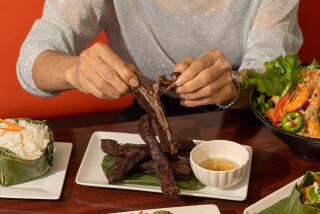U.S. Considers Military Assistance to Cambodia : Southeast Asia: Strength of rebel Khmer Rouge prompts concern. Thailand, other nations oppose arms shipments.
SINGAPORE — The United States is considering sending military assistance to Cambodia after a series of battlefield victories by anti-government Khmer Rouge rebels, a senior Clinton Administration official said Wednesday.
Winston Lord, assistant secretary of state for East Asian and Pacific Affairs, told the Australian Broadcasting Corp. that the United States is consulting with Australia and Cambodia’s neighbors about what kind of aid should be sent to help it “promote development, stability and democracy.”
Australian Foreign Minister Gareth Evans said his government is also “seriously considering” a request from Phnom Penh for military aid.
“Any military assistance to the Indochina area has a lot of historical resonance and potent political sensitivity, so we would want to work extremely closely with the Congress on this,” Lord said. “On the other hand, the Congress feels very strongly about the return of the Khmer Rouge to power.”
The United States has sent no arms to Indochina since the fall of Saigon in South Vietnam and Phnom Penh in Cambodia to Communist forces in April, 1975.
Arming Indochina is a highly emotional issue for many Americans because few have forgotten that the ill-fated U.S. involvement in the region began when President John F. Kennedy sent advisers to aid the South Vietnamese army in the early 1960s.
Asked if he favored sending U.S. military personnel to help train Cambodia’s army rather than sending arms, Lord replied: “The new integrated army needs training and a lot of help to be effective as a fighting force.”
The Khmer Rouge are widely blamed for the deaths of more than 1 million Cambodians in a reign of terror in the late 1970s. The group refused to take part in U.N.-sponsored elections in Cambodia last year and has refused to surrender large areas of western Cambodia to the newly elected government.
In March, Cambodia’s newly integrated royal army seized Anlong Veng and Pailin, two important Khmer Rouge-held towns near the border with Thailand. The government lost Anlong Veng almost immediately and managed to hold on to Pailin, a gem-mining center and the Khmer Rouge headquarters, for only a month.
The loss of the two towns represented a public relations catastrophe for the fledgling government in Phnom Penh, especially after reports that its army, which had clear numerical superiority, bolted when its commanding officers fled in panic.
Foreigners and thousands of residents of the western Cambodian city of Battambang were reported to have pulled back to Phnom Penh as anxiety rose about a looming Khmer Rouge offensive.
That concern appeared to have receded slightly Wednesday when Western aid officials reported that a Khmer Rouge attack against the northwestern town of Mongkol Borey appeared to have been repulsed by government troops and that the Maoist guerrillas had pulled back.
Still, Cambodia’s neighbors in Southeast Asia are growing anxious that the deteriorating military situation might unravel the delicate power-sharing arrangement that was hammered out last summer after the elections.
Under that deal, King Norodom Sihanouk’s son, Prince Norodom Ranariddh, became the country’s first prime minister, while former Communist Premier Hun Sen became second prime minister, and other top jobs were similarly parceled out.
“The last thing we can afford now is to have a conflict and crisis in our region,” Singapore Foreign Minister Shanmugam Jayakumar told a conference on Asia’s future Wednesday. “We are watching the developments in Cambodia with some concern.”
Despite the gravity of the situation, Cambodia’s appeals to its neighbors for arms aid in the last six months have been met by stony silence. The government army is said to have nearly exhausted its inventory of ammunition.
Thailand repeated Wednesday that it opposes the United States or Australia sending arms to Cambodia.
Deputy Prime Minister Amnuay Viravan told the same international conference in Singapore that Bangkok “questions the wisdom of sending arms to Cambodia,” preferring instead to see a political solution to the conflict.
The Cambodian government has accused the Thai military of resupplying the Khmer Rouge from stockpiles kept on the Thai side of the border.
While the Thais have denied the charges, last year, Thai police publicly displayed captured Khmer Rouge trucks carrying tons of war materiel at a base inside Thailand.
Judging by past practice of seeking “consensus” before taking joint action, Thailand’s opposition effectively means that the Assn. of Southeast Asian Nations--which includes Thailand, Malaysia, Singapore, Indonesia, Brunei and the Philippines--is likely to try to block Western assistance to Phnom Penh.
In an effort to reach a peaceful settlement of the civil war, Sihanouk has proposed that the Phnom Penh government hold talks with the Khmer Rouge in Pyongyang, North Korea, on May 27.
Ranariddh, Hun Sen and National Assembly Chairman Chea Sim announced Wednesday that they had agreed to attend the talks with the Khmer Rouge’s nominal leader, Khieu Samphan.
Sihanouk, who left Phnom Penh for Beijing on Wednesday to continue treatment for cancer, has suggested that the Khmer Rouge declare a unilateral cease-fire and open up their territory while a role for the party in the government is negotiated.
The Khmer Rouge have rejected the suggestion.
More to Read
Sign up for Essential California
The most important California stories and recommendations in your inbox every morning.
You may occasionally receive promotional content from the Los Angeles Times.










